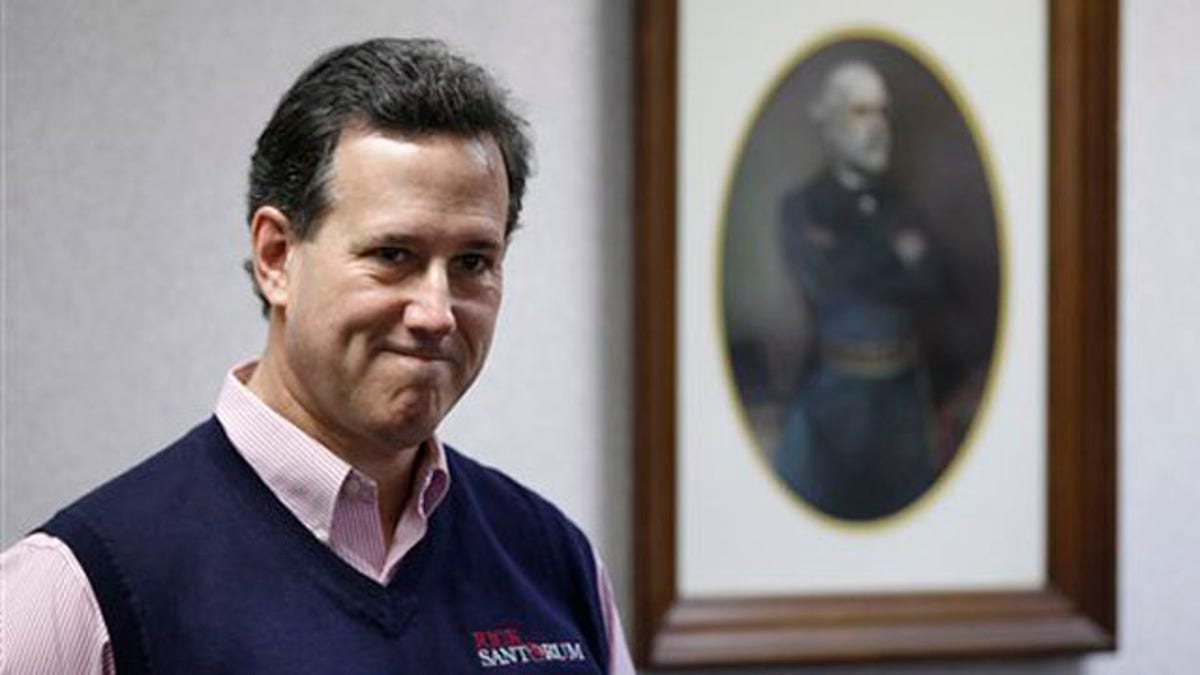
Jan. 14, 2012: Rick Santorum waits to make remarks as he is introduced during a campaign event in Greenville, S.C. (AP)
Dozens of evangelicals and other conservative leaders decided Saturday to rally around Rick Santorum for the Republican presidential nomination, after meeting in Texas to try and pick a consensus candidate.
The decision comes amid speculation that, among social conservatives reluctant to support frontrunner Mitt Romney, indecision over which GOP candidate to back could end up splitting their vote in the upcoming South Carolina primary -- in turn, helping Romney. The former Massachusetts governor has meanwhile launched a campaign to appeal to the values voter base, with new ads aimed at allaying concerns about his abortion record.
The meeting in Texas over the weekend was an attempt by conservative leaders to settle on a single, alternative candidate. It's unclear what impact the endorsement of the 150 or so leaders will have. Polls show Romney leading in South Carolina, while voters who don't support the former Massachusetts governor are mostly torn among Newt Gingrich, Ron Paul and Santorum.
The call to back Santorum was only finalized after three rounds of ballots. On the third ballot, Santorum received more than 70 percent of the votes cast -- some conservative leaders who had been backing Gingrich changed their votes in the end to support Santorum. The group rallied around the idea that Santorum, and not Gingrich, is the candidate best able to beat President Obama in November.
Tony Perkins, president of the Family Research Council, expressed surprise that the group agreed to back Santorum by such a wide margin, after failing to come together in support of a single candidate in 2008. In that race, the group didn't even meet until the primary race was basically over. This time, according to J.P. Duffy of the Family Research Council, the group wanted to come together "before it was too late."
The conservative leaders met Friday night and again on Saturday. According to Perkins, those at the summit listed repealing the federal health care overhaul as their top concern, followed by the national debt and abortion. The meeting took place at a pastor's ranch 90 miles outside of Austin -- every candidate except Jon Huntsman had surrogates at the summit to make presentations.
Perkins said he thinks the endorsement will have an influence in South Carolina. But the other candidates aren't ready to let Santorum claim that mantle.
Paul was out with a scathing attack on Santorum's conservative credentials Saturday, releasing an ad that slammed Santorum for backing increases in the debt ceiling while serving in the Senate. The ad called Santorum "another serial hypocrite who can't be trusted."
And Romney is working hard to burnish his image among social conservatives, many of whom have concern about his past support for abortion rights in Massachusetts.
Romney has released a web video and radio ad titled, "Shares Our Values." They cite support from prominent conservatives while making the case that his pro-life convictions are genuine.
"Today, Christian conservatives are supporting Mitt Romney because he shares their values -- the sanctity of life, the sacredness of marriage and the importance of family," the narrator says in the radio ad.
The ad even cited praise from South Carolina Republican Sen. Jim DeMint from 2007. The Tea Party-aligned senator endorsed Romney in the 2008 race but has not yet done the same in 2012.
With Santorum now receiving the thumbs-up from the Texas summit, Romney will also have to contend with Gingrich on the social conservative front. The former speaker, who has already aired an ad critical of Romney's abortion record, said Friday that there is a "clear contrast" between the two on the issue. He criticized Romney for appointing "pro-abortion judges" and allowing abortion to be covered in his state's health care overhaul -- though that coverage was tied to a court ruling.
Romney won the New Hampshire primary on Tuesday by a decisive margin, after narrowly winning the leadoff Iowa caucuses -- Santorum came from behind in Iowa to place second right behind Romney.
South Carolina is viewed as a critical primary contest, as the state has picked the candidate who went on to become the GOP nominee in every election since the primary's inception in 1980. Nobody dropped out after Tuesday's New Hampshire contest, fueling concerns among Romney critics that the wide field could boost his candidacy.
Huntsman and Rick Perry, another social conservative who once was considered the most likely candidate to take on Romney, are trailing in the polls, and neither has indicated an interest in bowing out. Perry spokesman Ray Sullivan defended his candidate's credentials after the Texas meeting Saturday.
"Rick Perry is the most successful and consistent social, fiscal and Tea Party conservative in the race for the White House," he said. "He is taking that conservative record and message to the voters of South Carolina and is confident they will make the right decision."
Fox News' John Roberts and Carl Cameron contributed to this report.




